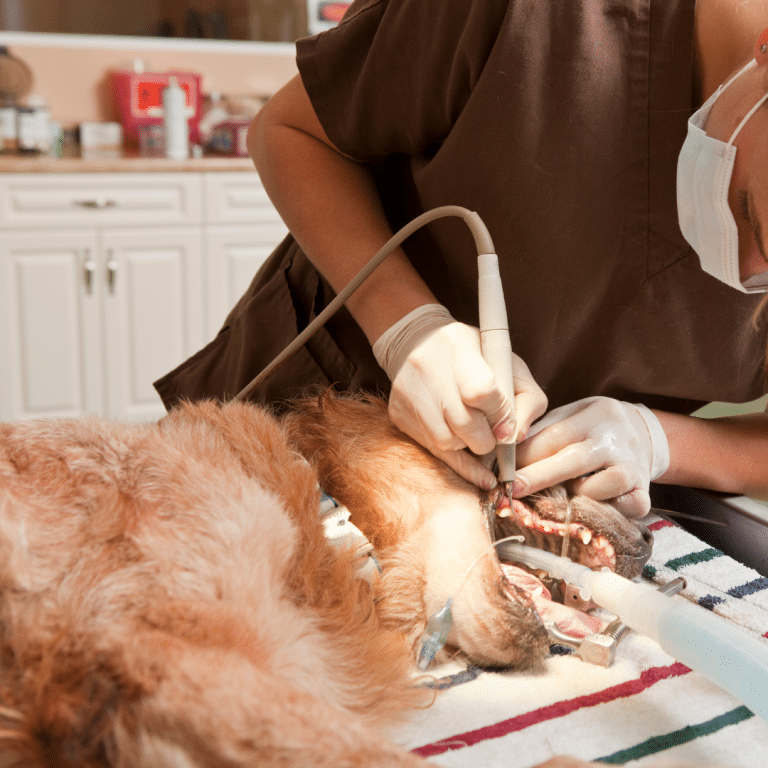Dental health plays an important role in your pet’s overall health, so we’re sharing some important information about why we make pet dental care a priority at Beach Avenue Animal Hospital.
By 3 years of age, most dogs and cats have some form of periodontal disease.
If your pet has periodontal disease, bad breath is the first sign you’ll likely notice. Also referred to as dental or gum disease, periodontal disease can not only cause pain, infection, gum recession, and tooth loss, but also changes in the heart, kidneys, and liver.
Periodontal Disease in Pets
Plaque forms on teeth constantly. When it’s not removed regularly it changes into hardened tartar within about 24 hours. Plaque continues to form on top of the tartar.
Tartar can’t be brushed away. It has to be removed during a professional dental cleaning.
If these layers of bacteria-laden tartar aren’t removed through cleaning, pets will end up with inflammation of the gums (gingivitis), which may progress to infection and loss of tooth support (advanced periodontal disease).
Pets who don’t receive regular dental care may need more than a dental cleaning. Therefore, extractions may be required to remove infected teeth and make a pet’s mouth healthy again.
Signs of Dental Health Problems in Pets
Dogs and cats with periodontal disease or other dental issues may have:
- Bad breath
- Brown or yellow teeth
- Red, swollen gums
- Bleeding from the mouth
- Broken or loose teeth
- Reluctance or refusal to eat
- Dropping food from the mouth
- Growling at food
- Chewing abnormally
- Excessive drooling
- Pawing at the mouth or face
- Sneezing
Bad breath in pets isn’t normal. It’s almost always a sign of oral issues.
Bring Your Pet In for a Dental Exam
It is important that you bring your pet in for regular veterinary dental health exams and cleanings.
For every dental procedure, we use digital x-rays to evaluate what your pet’s teeth look like under the gums—not just on the surface. Veterinarians can only assess about 40% of a dog or cat’s teeth by just looking at them, so we use oral x-rays to show what might be lurking unseen, such as painful root disease,. E.g. tooth resorption (which can affect cats or dogs), or the extent of a cracked tooth. That way, we can be sure we’re properly treating your pet.
Our team also takes plenty of precautions to make sure that dental procedures stay as safe as possible for our patients:
- Firstly, we perform preanesthetic bloodwork before a dental cleaning or surgery to ensure that pets are healthy enough to undergo anesthesia and to tailor anesthesia medications to individual pets as needed.
- Secondly, we monitor pets during and after dental procedures to make sure their vital signs stay within normal ranges, similar to protocols that are used when people undergo anesthesia.
During a dental cleaning, we will assess your pet’s teeth one by one.
We will:
- Check the periodontal depths for pockets. You may be familiar with this process if your own dentist has read numbers while probing your gums; the numbers indicate periodontal pockets and their depths. The larger the number, the larger the pockets and the less attached the gums are to the teeth.
- Look for any lesions (masses) or other oral issues.
- Examine the extent of tartar accumulation above and below the gumline.
- Remove built-up plaque and tartar and polish your pet’s teeth to smooth their surface.
If your pet needs additional dental care, we will make sure you understand what needs to be done and why.
Make Home Care a Priority
You play an essential role in your pet’s dental health. Brushing your pet’s teeth is the cornerstone of pet dental care and one of the most important steps you can take to help keep dental disease at bay in your dog or cat.
Never use human toothpaste in pets. It contains ingredients that can make your pet sick.
Although daily brushing is ideal, we understand that it may not always be practical. Fortunately, a number of dental products can help control plaque and tartar buildup in your pet:
- Dental diets and chews
- Dental toys
- Oral rinses and sprays
- Drinking water additives
Not all dental products are created equal. Look for products with the Veterinary Oral Health Council (VOHC) Seal of Acceptance.
When you are proactive about dental care, you can help protect your pet’s overall health.
The Importance of Regular Pet Dental Care
If you’re looking for pet dental care in downtown Vancouver, the experienced pet care providers at Beach Avenue will ensure that your dog or cat receives the most advanced veterinary care at an affordable price.
We recommend that pets visit us at least once a year for a dental evaluation as part of a routine diagnostic and wellness checkup and as needed for other pet dental health services. We’ll examine your pet’s teeth and gums and let you know what we recommend to maintain or improve your pet’s oral health.
If your pet is showing signs of dental trouble, however, don’t wait for your pet’s annual exam. Contact us or make an appointment right away!



